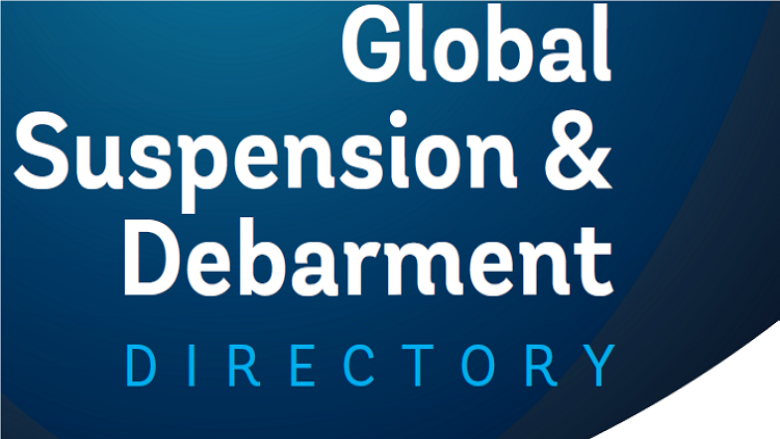Acknowledgments of Contributors:
We received input from numerous private practitioners, government officials, and academics with knowledge of exclusions in their jurisdictions that proved instrumental in developing this Directory. Indeed, this project would not have been possible without the knowledge, advice, and assistance of these esteemed experts:
- Mr. Anes Kafedžić, LANDWIESER Rechtsanwälte Partnerschaft mbB
- Mr. Carlos Ayres, Founding Partner, Maeda, Ayres e Sarubbi Advogados
- Ms. Christine Kang, Partner, JunHe LLP
- Professor Dae-in Kim, Ewha Womans University School of Law
- Mr. Daniel Rodríguez, Former Associate, BLP
- Mr. David Naus, Senior Director, Integrity Regime, Departmental Oversight Branch, Public Services and Procurement Canada
- Mr. Duc H. Nguyen, Suspension and Debarment Official, U.S. Environmental Protection Agency
- Mr. Federico Barrios, Director, BLP-Nicaragua
- Dr. Florian Wolf, Counsel, Blomstein Partnerschaft von Rechtsanwälten mbB
- Mr. Ivis Alvarado, Associate, BLP
- Mr. Jonathan Shapiro, Owner, Shapiro Advisors LLC
- Mr. José Álvarez, Partner, BLP
- Mr. Juan Carlos Tristán, Partner, BLP
- Ms. Mari Simovart, Dr. iur., Associate Professor, University of Tartu School of Law
- Mr. Michał Kania, Professor of Law, University of Silesia
- Ms. Mirella Lechna-Marchewka, Attorney-at-Law, Wardynski and Partners
- Ms. Nadia Arriaga, Former Associate, BLP
- Ms. Renata Politanski, Associate, Maeda, Ayres e Sarubbi Advogados
- Mr. Ricardo Pagliari Levy, Partner, Pinheiro Neto Advogados
- Mr. Robert Wyld, Consultant, Johnson Winter & Slattery
- Mr. Rodney Grandon, Managing Director, Affiliated Monitors, Inc.
- Mr. Roman Majtan, Procurement Specialist, The World Bank
- Mr. Sandeep Verma, Principal Secretary to Government of Rajasthan (India)
- Prof. Dr. Sarah Schoenmaekers, Endowed Professor of European Law, Open University; Associate Profesor of European Law, Programme Director Masters, Faculty of Law, Maastricht University
- Mr. Songezo Mabece, Legal Counsel, Competition Commission of South Africa
- Professor Sope Williams-Elegbe, Professor of Law and Head of the Department of Mercantile Law, Deputy Director, African Procurement Law Unit, Stellenbosch University
- Ms. Tan Jinghui, Lawyer
- Mr. Timothy J. Farris, Senior Procurement Consultant, Debarment Solutions Institute LLC
- Mr. Tomislav Šunjka, Principal and Founder, ŠunjkaLaw
- Ms. Zhang Fang, Deputy Director, China International Contractors Association (CHINCA)
The officers of the IBA’s Debarment and Exclusions Subcommittee deserve particular mention, including Co-Chairs Juan Ronderos and Roland Stein and Vice-Chairs Paul Kearney, Simon Laliberté, and Sope Williams-Elegbe. I wish to thank all the current and former project team members for the 2020 Survey within OSD, including Myles Ashong, Nikolaos Doukellis, Brittany Kouroupas, Caroline Wachtell, and Zeqing “Kate” Zheng, who put in a significant amount of time and effort finalizing the survey questions, receiving and reviewing survey responses, and preparing summaries for each jurisdiction.
Thanks to my current OSD colleagues – Jamieson Smith, Gaukhar Larson, Alexandra Manea, Muslima Maksudzoda, and Haiyue “Stephanie” Xue – for your steadfast support of this initiative. Thanks should also go to the former interns and colleagues who moved this project along during their (much too) short time with OSD, including Shirin Ahlhauser, Nathaniel Castellano, Berk Guler, Sati Harutyunyan, and Eleanor Ross. Finally, a very special thank you to Pascale Hélène Dubois and Paul Ezzeddin for initially developing the idea for an exclusion survey back in 2015, giving life to this project, and ultimately having the confidence to allow me to continue moving the project forward. This Directory would not have happened without your efforts.
Collin David Swan
Project Lead, Global Suspension & Debarment Survey
Senior Counsel (Sanctions), The World Bank Office of Suspension and Debarment
Vice-Chair, IBA Debarment and Exclusions Subcommittee

